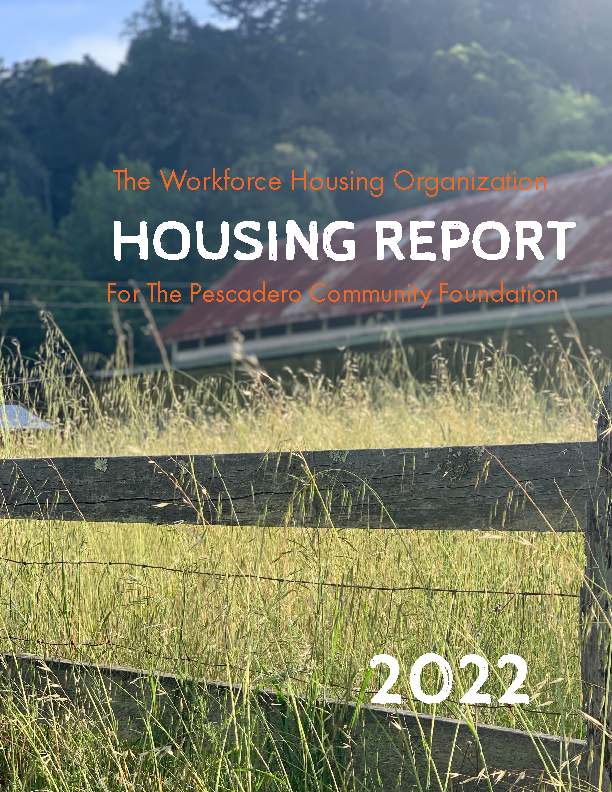The Workforce Housing Organization (WHO), one of the small local nonprofits under the umbrella of The Pescadero Community Foundation, has been working without much fanfare since 2002 to bring attention to the severe and growing housing shortage in this rural coastal community. Funded by a grant from The Pescadero Community Foundation, the recently released report reflects more than two decades of local community efforts to increase local housing stock and improve conditions in which the local workforce — particularly agricultural workers — live.
February 6 , 2023
Pescadero’s Workforce Housing Organization Publishes Report 25 Years in the Making
PESCADERO, CA
The publication of an 87-page report, containing information that will be shocking to many unfamiliar with local conditions, comes just as recent events have kept Pescadero, an unincorporated town of fewer than 300 residents, on front pages for weeks: disastrous weather events and a mass shooting, both shining a spotlight on squalid farmworker housing that has been allowed to exist out of view of the public and out of reach of government enforcement. The Workforce Housing Organization (WHO), one of the small local nonprofits under the umbrella of The Pescadero Community Foundation, has been working without much fanfare since 2002 to bring attention to the severe and growing housing shortage in this rural coastal community. Funded by a grant from The Pescadero Community Foundation, the recently released report reflects more than two decades of local community efforts to increase local housing stock and improve conditions in which the local workforce — particularly agricultural workers — live. This report minces no words, pointing out that “Pescadero High/Middle School students can’t drink the water. Downtown Pescadero and surrounding areas regularly deal with flooding that grinds daily business to a halt. Good teachers leave the community because there is virtually no housing they can afford. Farmworkers struggle to find safe places to live and pay exorbitant rents to live in inadequate, even squalid, housing. Visitors and locals stand in line for the porta-potty that enjoys pride of place on Pescadero’s primary downtown intersection. Because Pescadero is unincorporated, with no paid staff, community volunteers struggle to invest the time needed to deal with the layers of regulation around housing and coastal community issues.” Authored by WHO officer Kelly Greenwood, the document points to “County government, institutional landowners, community organizations, local businesses and residents” who “bicker about who is in charge and who is at fault for the lack of housing, as well as the lack of a coherent plan for moving toward a more resilient and sustainable future. A sewer solution the county proposed is too expensive for local residents to shoulder. A divisive and underfunded planning process has made it difficult to achieve momentum for necessary infrastructure investments. Different community organizations with different goals approach the problems from unique perspectives, but without the funding for a professional planning process to drive community planning toward a specific plan to implement change, roadblocks to new housing like lack of wastewater treatment remain insurmountable obstacles.” As bleak as the picture is, Greenwood points to solid next steps which it is hoped, with new attention from San Mateo County and California State governments, as well as national media, can be taken immediately toward implementing solutions.
The complete report is available as a printable PDF as well as an online, interactive document. URLs are underlined and blue. If you are reading a printed copy, you may visit https://indd.adobe.com/view/6df8c652-861c-47ad-9803-68b1444ba22f to read the interactive version, in order to take full advantage of the bookmarks, cross-references and links.
